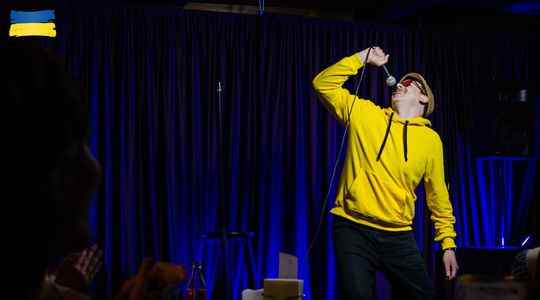In a reportage broadcast on the first Russian channel, a brand new Lada criss-crosses a poor village in the depths of Russia. At the wheel, the parents of a young Russian soldier killed in action in Ukraine have just bought the vehicle with “coffin money” paid by the state. “Alexei dreamed of a white car. His first trip will be to the cemetery”, describes in a dramatic tone the journalist of this state media.
1200 kilometers away, this soundtrack is worth gold for Sviat Zahaikevitch. “Russian propaganda goes so far that we hardly need to add more to make people laugh!” Launches the humorist who hijacked the sequence in a restaurant in kyiv. Before the war, his troop of stand up was full house in trendy places in the capital, laughing at his sentimental failures, the cost of living and, sometimes, at the beginning of the year, at the maneuvers of the Russian soldiers massed at the border. But the military exercises turned into war; and the jokes about a possible invasion became a reality.
Dark humor and self-mockery
“To serve the war effort, the government told us to do what we know how to do best, so we continue to try to make people laugh,” summarizes Sviat. In March, this big, mustachioed man with infectious energy had stayed in the capital – yet almost surrounded by the Russians – and had published videos of stand up with his friends to raise funds for the army. When we meet him in May, the city is almost empty, but he has resumed his shows in the basement of a trattoria, sheltered from potential bombardments. In two hours, six actors parade to tell their own way about this conflict in front of about fifty neophytes and regulars.
“Ukrainian soldiers say the Russians have no brains because a bullet goes in one ear and comes out the other,” Sviat said. Today, we laugh at the enemy, but also at ourselves. And this absurd new reality, where wedding drone pilots use their skills to bomb Russians and tractor-riding farmers rob enemy tanks.
“Making fun of war makes it easier to live with psychologically”
Some comedians are part of the Ukrainian army, whose amateurism – despite its heroic struggles – sometimes makes you smile. The difference between Russians and Ukrainians? “We can laugh at ourselves without getting arrested,” tackles Arthur Petrov, one of the comedians of the evening. And to narrate by forcing the feature his setbacks at a local checkpoint where local volunteers of the territorial defense – civilians who took up arms – retained, by an excessive respect of the procedures, a convoy of experienced fighters.
“Humor is one of the best ways to deal with the tragedy of the situation”, smiles Anna Klimentchouk, came to watch the show. “Making fun of war makes it easier to live with psychologically”, believes the young woman for whom “the darker the humor, the better”.
But where is the limit when bodies have been thrown into mass graves? “We can laugh at everything, but not with everyone”, retort the irreverent comedians – even if no one jokes about the victims of war crimes. “Why is a Russian mother mourning her soldier son?” asks Sviat. “Because the body came back from Boutcha without the washing machine.” Bursts of laughter and moved looks in the subdued room, thinking of the martyred city, 30 kilometers away, where the Russians killed and raped en masse, and looted everything – even household appliances.
A year ago, Sviat spoke Russian on stage. But the 30-year-old switched to Ukrainian. Until recently, many cultural works were produced in Pushkin’s language in order to open up the Russian market. From the end of the 1990s, Volodymyr Zelensky himself made a name for himself by participating in a Russian improvisation competition. In 2014, after the annexation of Crimea, in a parody television news from Red Square in Moscow, the future warlord was already mocking Russia. “Everything is democratic here. Someone can shout ‘glory to Ukraine’ and nothing will be done to them… Well, nothing that is not cured by the modern health system.” The future will tell if the mocking comedian, elected president in 2019, will be the one who will bring down the dictator.
This article is from our special issue “We Ukrainians”on newsstands August 24, in partnership with BFMTV.
